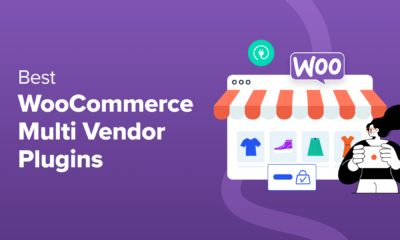SOCIAL
Leveraging Social Media To Grow Your Career In 2023

Employees are ready to change their jobs, with nearly half of American workers planning to look for a new job in the coming six months. According to a new Robert Half report, which surveyed 2,500 professionals, around 46% of them said they plan on making a career or job change in the first half of the year.
Job-hopping has become a workplace trend among young working professionals in the post-pandemic labor market. A recent Gallup study found that 60% of surveyed millennials – ages 27 to 40 years – are more likely to look for different opportunities this year. The percentage of non-millennials workers looking to switch jobs is roughly 15% lower.
A majority of Generation Z candidates have also claimed that they are likely to make a job change this year. In a 2022 Lever Great Resignation report, around 65% of Gen Z professionals said that they are likely to leave their job by the end of the year. Moreover, 13% of them are twice as likely to quit their jobs in the next month.
Job-hopping has become almost synonymous in the post-COVID workforce, and younger professionals are fueling this trend by leaving unfulfilling roles and moving on to greener pastures.
Yet, with so many professionals changing jobs, or looking to switch careers, even against the backdrop of a looming recession, many of them have geared themselves towards social media as a way to build a professional brand and market themselves to potential employers.
Using Social Media For Career Growth
Keeping your social media professional can be a hard ball to juggle. In a 2020 Harris Poll survey, around 70% of employers said that every company should screen candidates’ social media throughout the hiring process. Additionally, the majority of employers – 78% – believe that all their current employees should adhere to a work–appropriate social media profile.
Employees should care about what they share and post on social media. Although the debate over whether social media screening during the hiring process is ethical is still ongoing, candidates willing to leverage social media to develop or boost their careers will need to set up a social media strategy that can help them land the job they want.
Much of our digital identity is pinned to our social media accounts, and a lot of what we share, like and the people we interact with via these channels can speak a great deal of the types of person we are outside of the workplace.
Aside from employees using these platforms to grow their network, or search for possible job opportunities, employers and recruiters are using it to look for any possible red or green flags that you might bring to the workplace.
Social media has moved beyond its traditional form, and today it’s become a digital ecosystem that helps to connect like-minded professionals and their potential employers.
How To Use Social Media To Boost Career Opportunities
Searching for a job is more than browsing through recruitment websites and job listings on LinkedIn or Google. The internet, and social media is a vast place, with near-endless possibilities, and when it comes to growing your career through social media, you will need to know a few things first.
Have A Social Strategy
It might sound strange at first, but having a social media strategy will help you come in contact with the right people faster. Your social media strategy should include building an online identity that reflects your professional and personal side.
You can use different platforms for different connections or networks, it’s all about how you present yourself through your brand. Think of the type of content you share regularly, does it reflect who you are as a professional? How often do you post, or reply to comments and messages? Are there any areas where you can improve or update the information to help you grow your network of contacts?
Write some questions down to get you started, and start working on building an online identity that can get noticed by like-minded individuals in the same industry.
Network With Industry Professionals
Nowadays it’s easier than ever before to reach out to a company or recruiter through their social media, and the same goes for connecting with professionals working in the same industry.
Instead of using social media to only share insightful content, or engage with your friends, try to grow your professional network. On top of this, it’s important to engage with these people as well, even if it’s simply exchanging a few words now and again.
Be active in your mission to get to know the people that are out there, and spend a bit of time researching their profiles to better understand the type of skills and qualifications these people may have. Networking is one of the best possible ways to move around your industry without putting in much effort.
Grow Your Skills
Looking at other people’s social media profiles, whether it’s Twitter or Indeed.com, or even Instagram will give a better idea of the type of skills you might need to develop to help grow and make the next big career jump.
Often professionals will share their skills, and what they’re experts in at the top of their social media accounts, this way it is easier for recruiters to know who the person is, and for like-minded professionals to engage with them.
If you compare the skills of several professionals already working in the field you’re interested in, you will get a better idea of where you might need to upskill yourself by completing some courses or doing a bit of reading.
Advertise Your Expertise
When we say advertise, we don’t necessarily mean flashy and colorful digital adverts that you’d hope will get the attention of your potential employer.
Instead try and convey your expertise through the type of content you can share such as blog posts, news articles, industry research, or even projects you’ve worked on. Additionally, you can also share your job title and relevant experience in the bio section of your profile.
The better you are at showing people your expertise in a professional, yet unpretentious way, the faster your feed will fill up with similar content and other experienced individuals.
Update Your Profiles
This is relevant to almost every social media profile you have, regardless of what you use it for. People often neglect social media platforms they don’t use anymore, and while it can be tedious to spend so much time updating photos or replying to messages, decide on a couple of platforms you’d like to use and stick to them.
Make sure that the platforms you end up using have a recent photo, and that all other relevant personal information has been updated such as your job title, industry experience, and your current city. You don’t need to do this every week, only when needed, or when you’ve changed jobs or moved.
The better you curate your social media, the easier it will be for employers and recruiters to notice you as you actively begin to network.
Final Words
Social media can be a professional tool, despite it receiving so much negative clout in recent years. Although it’s hard to determine whether possible employers or recruiters will screen your social media accounts before or during the hiring process, it’s best to always keep a well-groomed online identity – especially if you’re looking to make progress in your career.
Make well-informed decisions, and think about the type of content you’re sharing. Remember to engage with like-minded professionals, and have conversations online through the information you share with your followers.
The better you are at curating one or two social media platforms for career purposes, the quicker you’ll be able to expand your network, and grow your professional skills. Don’t think too much about it, try and have a balance as much as possible, as this will help you to enjoy your social media experience while maintaining a professional, yet fun digital identity.
Published First on ValueWalk. Read Here.
Featured Image Credit: Photo by Fauxels; Pexels; Thank you!
SOCIAL
Snapchat Explores New Messaging Retention Feature: A Game-Changer or Risky Move?

In a recent announcement, Snapchat revealed a groundbreaking update that challenges its traditional design ethos. The platform is experimenting with an option that allows users to defy the 24-hour auto-delete rule, a feature synonymous with Snapchat’s ephemeral messaging model.
The proposed change aims to introduce a “Never delete” option in messaging retention settings, aligning Snapchat more closely with conventional messaging apps. While this move may blur Snapchat’s distinctive selling point, Snap appears convinced of its necessity.
According to Snap, the decision stems from user feedback and a commitment to innovation based on user needs. The company aims to provide greater flexibility and control over conversations, catering to the preferences of its community.
Currently undergoing trials in select markets, the new feature empowers users to adjust retention settings on a conversation-by-conversation basis. Flexibility remains paramount, with participants able to modify settings within chats and receive in-chat notifications to ensure transparency.
Snapchat underscores that the default auto-delete feature will persist, reinforcing its design philosophy centered on ephemerality. However, with the app gaining traction as a primary messaging platform, the option offers users a means to preserve longer chat histories.
The update marks a pivotal moment for Snapchat, renowned for its disappearing message premise, especially popular among younger demographics. Retaining this focus has been pivotal to Snapchat’s identity, but the shift suggests a broader strategy aimed at diversifying its user base.
This strategy may appeal particularly to older demographics, potentially extending Snapchat’s relevance as users age. By emulating features of conventional messaging platforms, Snapchat seeks to enhance its appeal and broaden its reach.
Yet, the introduction of message retention poses questions about Snapchat’s uniqueness. While addressing user demands, the risk of diluting Snapchat’s distinctiveness looms large.
As Snapchat ventures into uncharted territory, the outcome of this experiment remains uncertain. Will message retention propel Snapchat to new heights, or will it compromise the platform’s uniqueness?
Only time will tell.
SOCIAL
Catering to specific audience boosts your business, says accountant turned coach

While it is tempting to try to appeal to a broad audience, the founder of alcohol-free coaching service Just the Tonic, Sandra Parker, believes the best thing you can do for your business is focus on your niche. Here’s how she did just that.
When running a business, reaching out to as many clients as possible can be tempting. But it also risks making your marketing “too generic,” warns Sandra Parker, the founder of Just The Tonic Coaching.
“From the very start of my business, I knew exactly who I could help and who I couldn’t,” Parker told My Biggest Lessons.
Parker struggled with alcohol dependence as a young professional. Today, her business targets high-achieving individuals who face challenges similar to those she had early in her career.
“I understand their frustrations, I understand their fears, and I understand their coping mechanisms and the stories they’re telling themselves,” Parker said. “Because of that, I’m able to market very effectively, to speak in a language that they understand, and am able to reach them.”Â
“I believe that it’s really important that you know exactly who your customer or your client is, and you target them, and you resist the temptation to make your marketing too generic to try and reach everyone,” she explained.
“If you speak specifically to your target clients, you will reach them, and I believe that’s the way that you’re going to be more successful.
Watch the video for more of Sandra Parker’s biggest lessons.
SOCIAL
Instagram Tests Live-Stream Games to Enhance Engagement

Instagram’s testing out some new options to help spice up your live-streams in the app, with some live broadcasters now able to select a game that they can play with viewers in-stream.
As you can see in these example screens, posted by Ahmed Ghanem, some creators now have the option to play either “This or That”, a question and answer prompt that you can share with your viewers, or “Trivia”, to generate more engagement within your IG live-streams.
That could be a simple way to spark more conversation and interaction, which could then lead into further engagement opportunities from your live audience.
Meta’s been exploring more ways to make live-streaming a bigger consideration for IG creators, with a view to live-streams potentially catching on with more users.
That includes the gradual expansion of its “Stars” live-stream donation program, giving more creators in more regions a means to accept donations from live-stream viewers, while back in December, Instagram also added some new options to make it easier to go live using third-party tools via desktop PCs.
Live streaming has been a major shift in China, where shopping live-streams, in particular, have led to massive opportunities for streaming platforms. They haven’t caught on in the same way in Western regions, but as TikTok and YouTube look to push live-stream adoption, there is still a chance that they will become a much bigger element in future.
Which is why IG is also trying to stay in touch, and add more ways for its creators to engage via streams. Live-stream games is another element within this, which could make this a better community-building, and potentially sales-driving option.
We’ve asked Instagram for more information on this test, and we’ll update this post if/when we hear back.
-

 MARKETING6 days ago
MARKETING6 days agoEffective Communication in Business as a Crisis Management Strategy
-

 SEARCHENGINES6 days ago
SEARCHENGINES6 days agoGoogle Won’t Change The 301 Signals For Ranking & SEO
-

 SEO6 days ago
SEO6 days agobrightonSEO Live Blog
-

 PPC6 days ago
PPC6 days ago9 Ecommerce Trends to Boost Your Business in 2024
-

 SEO6 days ago
SEO6 days agoHow To Write ChatGPT Prompts To Get The Best Results
-

 SEO4 days ago
SEO4 days agoGoogle March 2024 Core Update Officially Completed A Week Ago
-

 WORDPRESS4 days ago
WORDPRESS4 days ago9 Best WooCommerce Multi Vendor Plugins (Compared)
-
SEARCHENGINES5 days ago
Daily Search Forum Recap: April 25, 2024















You must be logged in to post a comment Login